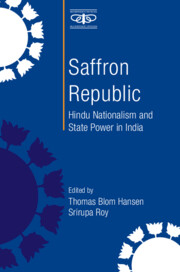4 - Hindutva Establishments: Right-wing Think Tanks and the Mainstreaming of Governmental Hindutva
Published online by Cambridge University Press: 31 May 2022
Summary
In 2014, the Bharatiya Janata Party (Indian People's Party, BJP for short), the political wing of India's ethnomajoritarian Hindu nationalist movement that aims to redefine the country as a ‘Hindu-first’ nation, won the general elections and formed the government with a clear majority of 282 out of 543 parliamentary seats. Five years later, the BJP further consolidated these electoral gains. Defying the anti-incumbency pattern of Indian politics in which political parties are ousted from power in successive elections by a disillusioned electorate (Roy and Sopariwala 2019), the BJP returned to power in the 2019 elections with an increased tally of 303 parliamentary seats.
The BJP's ascent to national power since 2014 marks a major change in the political life of Hindu nationalism, from a mobilizational politics of insurgent opposition to a governmental politics of rule. While the former has been the familiar form of Hindu nationalist politics for close to a century, the latter is a new development that is less than a decade old. Reflecting this chronology, the main focus of the vast and rich scholarship on Hindu nationalism, or Hindutva, is on its ‘movemental’ aspects, that is, the practices of agitational politics, popular mobilization, and the strategies of ideological reproduction that recruit individuals and groups to the cause of Hindutva. Moving beyond this protest movement framework, this chapter explores the relatively uncharted terrain of ‘governmental Hindutva’, a formation that reflects both the vision of cultural and religious homogenization that the Hindu nationalist movement has promoted for close to a century and a more recent political–institutional vision of India as a majoritarian ‘ethnic democracy’ with a strong unitary state governed by authoritarian populist strongmen leaders (Jaffrelot 2019; Peer 2017). What are the modes and effects of this transition from nationalist mobilization to authoritarian populist governance? What changes when Hindu nationalism is the currency of rule and not protest?
Going beyond existing accounts of deinstitutionalization and anti-elitism as the necessary and main consequences of populists in power (Crewe and Sanders 2020; Kyle and Gultchin 2018; Mounck 2018; Varshney 2019), I argue in this chapter that parallel processes of institutional innovation and elite formation are equally central to the project of governmental Hindutva.
- Type
- Chapter
- Information
- Saffron RepublicHindu Nationalism and State Power in India, pp. 72 - 106Publisher: Cambridge University PressPrint publication year: 2022
- 1
- Cited by

